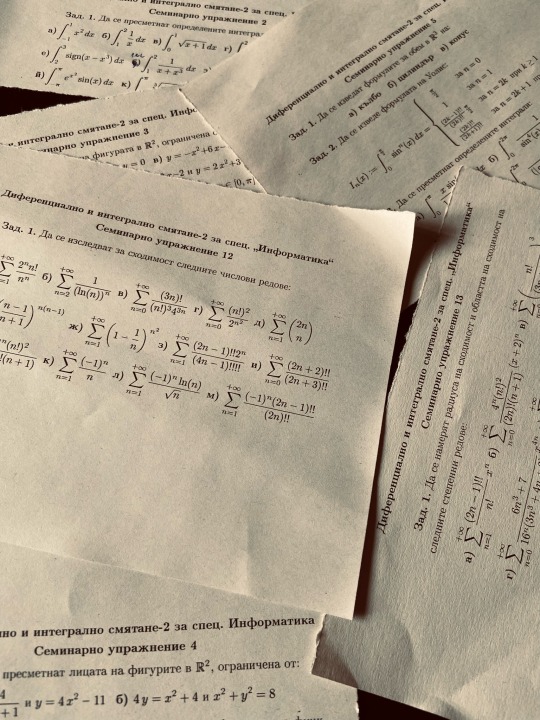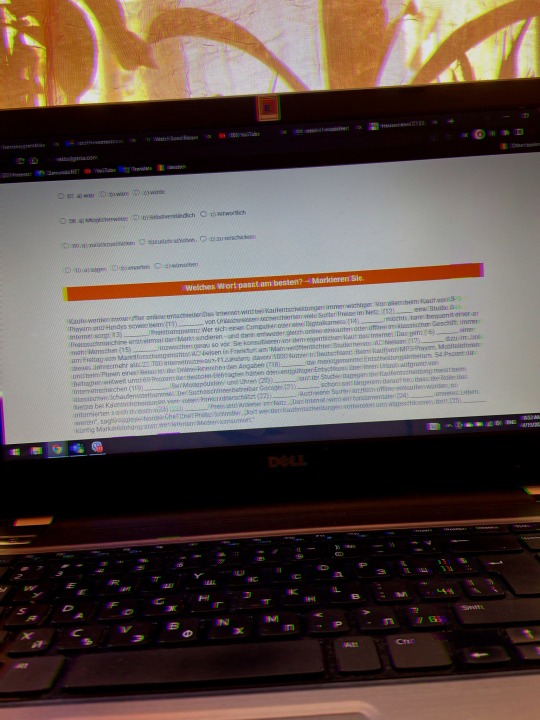Text




For several months, I haven't rested because of the university. We are overloaded with work there, and even on weekends, I have to work hard. It's good that there is this trip to Jordan so that I can finally get some fresh air and rest.
#travel#Jordan#trip#Jordan trip#dessert#sand#sky#cloudy#photografy#my phoyography#beautiful photos#traveling#beautiful#rest
6 notes
·
View notes
Text

Preparing for the calculus exam tomorrow. Unfortunately, this semester I was very ill and couldn't attend most of the exercises and lectures, so my preparation at the moment is a nightmare. In the last week, I'm only solving integrals and sums.
Wish me luck!
#math student#study#studyblr#studying#study blog#student#study motivation#studyspo#study hard#motivation#exam#math#calculus
1 note
·
View note
Text
Mathematics is an awesome science. I really love it when proving higher algebra requires me to define 1 to be different from 0.
#study#studyblr#studying#study blog#student#study motivation#studyspo#study hard#math education#mathblr#math#university#computer science student#math student#math stuff
2 notes
·
View notes
Text
This was so helpful! I'm currently studying for a calculus exam and I was stuck because I couldn't remember all the definitions and theorems. The material we take is a hell of a lot and it is difficult to remember even the methods of solving tasks.
tips for studying math
I thought I could share what I learned about studying math so far. it will be very subjective with no scientific sources, pure personal experience, hence one shouldn't expect all of this to work, I merely hope to give some ideas
1. note taking
some time ago I stopped caring about making my notes pretty and it was a great decision – they are supposed to be useful. moreover, I try to write as little as possible. this way my notes contain only crucial information and I might actually use them later because finding things becomes much easier. there is no point in writing down everything, a lot of the time it suffices to know where to find things in the textbook later. also, I noticed that taking notes doesn't actually help me remember, I use it to process information that I'm reading, and if I write down too many details it becomes very chaotic. when I'm trying to process as much as possible in the spot while reading I'm better at structuring the information. so my suggestion would be to stop caring about the aesthetics and try to write down only what is the most important (such as definitions, statements of theorems, useful facts)
2. active learning
do not write down the proof as is, instead write down general steps and then try to fill in the details. it would be perfect to prove everything from scratch, but that's rarely realistic, especially when the exam is in a few days. breaking the proof down into steps and describing the general idea of each step naturally raises questions such as "why is this part important, what is the goal of this calculation, how to describe this reasoning in one sentence, what are we actually doing here". sometimes it's possible to give the proof purely in words, that's also a good idea. it's also much more engaging and creative than passively writing things down. another thing that makes learning more active is trying to come up with examples for the definitions
3. exercises
many textbooks give exercises between definitions and theorem, doing them right away is generally a good idea, that's another way to make studying more active. I also like to take a look at the exercises at the end of the chapter (if that's the case) once in a while to see which ones I could do with what I already learned and try to do them. sometimes it's really hard to solve problems freshly after studying the theory and that's what worked out examples are for, it helps. mamy textbooks offer solutions of exercises, I like to compare the "official" ones with mine. it's obviously better than reading the solution before solving the problem on my own, but when I'm stuck for a long time I check if my idea for the solution at least makes sense. if it's similar to the solution from the book then I know I should just keep going
4. textbooks and other sources
finding the right book is so important. I don't even want to think about all the time I wasted trying to work with a book that just wasn't it. when I need a textbook for something I google "best textbooks for [topic]" and usually there is already a discussion on MSE where people recommend sources and explain why they think that source is a good one, which also gives the idea of how it's written and what to expect. a lot of professors share their lecture/class notes online, which contain user-friendly explenations, examples, exercises chosen by experienced teachers to do in their class, sometimes you can even find exercises with solutions. using the internet is such an important skill
5. studying for exams
do not study the material in a linear order, instead do it by layers. skim everything to get the general idea of which topics need the most work, which can be skipped, then study by priority. other than that it's usually better to know the sketch of every proof than to know a half of them in great detail and the rest not at all. it's similar when it comes to practice problems, do not spend half of your time on easy stuff that could easily be skipped, it's better to practice a bit of everything than to be an expert in half of the topics and unable to solve easy problems from the rest. if the past papers are available they can be a good tool to take a "mock exam" after studying for some time, it gives an opoortunity to see, again, which topics need the most work
6. examples and counterexamples
there are those theorems with statements that take up half of the page because there are just so many assumptions. finding counterexamples for each assumption usually helps with that. when I have a lot of definitions to learn, thinking of examples for them makes everything more specific therefore easier to remember
7. motivation
and by that I mean motivation of concepts. learning something new is much easier if it's motivated with an interesting example, a question, or application. it's easier to learn something when I know that it will be useful later, it's worth it to try to make things more interesting
8. studying for exams vs studying longterm
oftentimes it is the case that the exam itself requires learning some specific types of problems, which do not really matter in the long run. of course, preparing for exams is important, but keep in mind that what really matters is learning things that will be useful in the future especially when they are relevant to the field of choice. just because "this will not be on the test" doesn't always mean it can be skipped
ok I think that's all I have for now. I hope someone will find these helpful and feel free to share yours
#study#studyblr#studying#study blog#student#study motivation#studyspo#school#study hard#math#calculus
200 notes
·
View notes
Text

27.03.2023| Advanced Algebra Notes
#study#studyblr#studying#study blog#student#study motivation#studyspo#my photgraphy#school#study hard#motivation#light#spotify#dark#exam#mathematics#algebra#mathblr#math exam
14 notes
·
View notes
Text

Sometimes the learning process does not allow us to be organized.
#study#studyblr#studying#study blog#university#student#study motivation#studyspo#my photgraphy#study hard#motivation#light#spotify#dark#exam#math#algebra#math exam#mathblr#math education#math struggles#notes#messy aesthetic
41 notes
·
View notes
Text

Time to get to work.
#study#studyblr#studying#study blog#school#student#study motivation#studyspo#my photgraphy#study hard#motivation#light#dark#sunrise#breakfast#toast#boiled eggs#avocado#coffee
104 notes
·
View notes
Text

#my photgraphy#summer#dark#nightfall#night#sky#clouds ☁️#clouds#cloudy#sunset#sunrise#summer sunset#summer sunrise#park#parking lot#cars#orange#pink#blue#iphone#photo#my photo#m.e.#motivation#beautiful#summer sky#skylovers#friends#alone#quiet
4 notes
·
View notes
Text


#sun#sunset#summer#sunrise#vsco#my photgraphy#light#dark#day#night#life goals#mountains#river#lake#walkingaround#nature#photoblog#photoshoot#iphone#motivation#woods#get motivated#motivating myself#beautiful#real life#beauty#nightlife#night sky#late night#pancharevo
16 notes
·
View notes
Text


15.04.2022
I'm terribly worried about tomorrow's exam. Wish me luck 🙏
#study#studyblr#studying#school#student#studyspo#study blog#study hard#study motivation#exam#deutschlernen#german studyblr#german exam#examination#test#ösd#zertifikat#zertifikat c1#Spotify
45 notes
·
View notes
Text
The best thing about books is that you get lost in a wonderful world.
The worst -> the story ends quickly...
#study#read in 2022#reader#reading#books#book blog#reading a book#read more#booklover#bookaddict#bookaholic#true story#student#book therapy#bookblr
6 notes
·
View notes